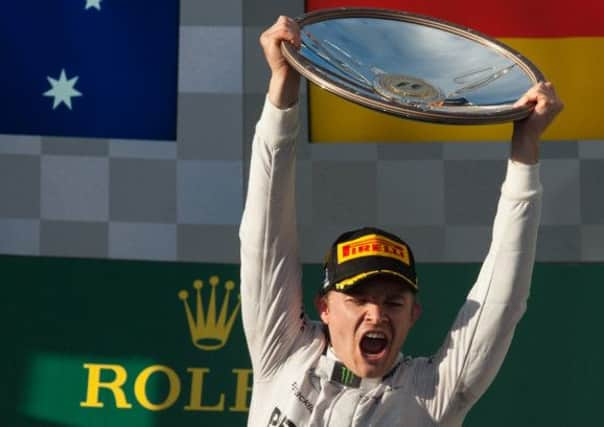Rosberg’s delight is eclipsed by ejection of Ricciardo


Just over five hours after Daniel Ricciardo had thrilled his home crowd in finishing runner-up to Mercedes’ Nico Rosberg in the Australian Grand Prix on his debut for Red Bull, the 24-year-old was disqualified over a technical fuel infringement.
Within minutes of the FIA’s decision being announced, the team notified motor sport’s governing body of their intention to appeal, due to be confirmed within the next 96 hours by the Austrian motor sport federation, under whose auspices they operate.
Advertisement
Hide AdAdvertisement
Hide AdThe latest set of regulations, to accommodate the introduction of the new 1.6-litre V6 turbo-charged power units and the various accompanying energy-saving devices, are highly complicated and technical.
Among them is that the cars now start with a maximum 100 kilograms of fuel, as opposed to 140-150kg in previous seasons, and operate with a fuel flow rate of no more than 100kg per hour.
Ricciardo’s car, however, was found to consistently exceed that rate, and as a clear breach of the FIA regulations he has been excluded from the race result, now provisional until after a Court of Appeal hearing.
In layman’s terms, the fuel-flow rate is monitored by an FIA sensor. There have been accusations, however, the sensors are faulty and have been providing misleading readings.
Advertisement
Hide AdAdvertisement
Hide AdRed Bull, of their own volition, chose to use their own sensor to determine the fuel-flow rate which had not been cleared by the FIA.
FIA race director Charlie Whiting has confirmed Red Bull were warned twice about the matter after qualifying, and again five laps into the race, but chose to ignore the directive.
As an FIA statement read: “Regardless of the team’s assertion that the sensor was at fault, it is not within their discretion to run a different fuel-flow measurement model without the permission of the FIA.”
Red Bull team principal Christian Horner, though, has described himself as “extremely disappointed” and “ quite surprised” with the stewards’ decision.
Advertisement
Hide AdAdvertisement
Hide AdHorner added: “Through the appeal process it will be quite clear the car has conformed at all times with the regulations and we’ve fully complied with the technical regulations.
“These fuel-flow sensors that have been fitted by the FIA have proved problematic throughout the pit lane since the start of testing. There have been discrepancies in them, even unreliable, and I think some cars may well have run without them during the race itself, or even failed during the race itself.
“We had a fuel-flow sensor fitted to the car that we believe to be in error. We wouldn’t be appealing if we weren’t extremely confident we have a defendable case.
“I believe we have been compliant with the rules and the documents and investigation that will be submitted within the appeal will demonstrate that.”
Advertisement
Hide AdAdvertisement
Hide AdThe race was dominated by Rosberg who finished 24.5 seconds ahead of Ricciardo, the duo joined on the podium by Kevin Magnussen on his F1 debut with McLaren.
The 21-year-old became the first Dane to finish in the top three, and followed closely home by team-mate Jenson Button who had started 10th.
The race, however, was less successful for Rosberg and Ricciardo’s more illustrious team-mates as both Lewis Hamilton and reigning champion Sebastian Vettel were forced to retire.
Behind Button was Ferrari’s Fernando Alonso, with team-mate Kimi Raikkonen eighth.
Advertisement
Hide AdAdvertisement
Hide AdHamilton hailed Mercedes team-mate Rosberg’s victory as “a massive positive” despite his own “costly hiccup” that robbed him of the chance of a win.
Despite clinching the 32nd pole position of his Formula 1 career on Saturday, Hamilton was forced to retire from the race after just three laps when it become apparent there was a terminal fault with a cylinder.
As Hamilton then looked on for the remainder of the race, Rosberg completed a faultless march to the fourth win of his career.
“I wanted to keep going, but we had to play safe and save the engine,” said Hamilton. “I’m disappointed when I think about all the work that has gone on back at our factories.”
Advertisement
Hide AdAdvertisement
Hide AdThe positive for Hamilton is that Rosberg’s car ran faultlessly all weekend, proving what Mercedes are capable of.
“It is what it is,” he added. “The really positive thing is the car is fantastic. There’s a massive positive as we won the race, and by a long way which is a cool thing.”